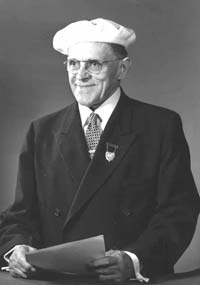|
In This Age of Plenty
|
|
|
|
Louis Even |
The
title of this book In
This Age of Plenty clearly shows that we are now dealing
with an economy of plenty, in which the access to the huge possibilities
of modern production is made easier for all.
Old
economics was ruled by the presence of gold or any other rare
commodity, when production itself was scarce. But it is to go against
progress and logic, to want to keep an instrument linked to scarcity, to
confer claims on automated production.
In
the first part of this volume, we recall essential and very simple
notions that everybody readily admits, but which are almost totally
ignored in the present economic organism. The ends no longer direct the
means. A short study of the present monetary system shows that money
governs where it ought to serve. We present the Social Credit proposals
as a remedy, explaining the outlines, without going into the methods of
application. The problem, we believe, is not so much to develop a
technique of operation, as to reach an agreement on ideas, which seem
both too simple and too bold to the minds who are accustomed to losing
sight of the ends, and to getting bogged down in the complexity of the
means. So, several chapters are especially intended to justify the
Social Credit doctrine.
The second part reproduces, without necessarily being linked with each other, certain speeches and articles which throw light on the various aspects of Social Credit.
In
offering this book to the public, we have especially in mind the
ordinary reader, who has no special knowledge of economics. Even in
dealing with specific topics, we avoid technical terms as much as
possible, since they are more likely to tire readers than to enlighten
them. We strived to write in such a way as to be easily understood by
the great majority of people which, besides, is in the spirit of an
economy of plenty to serve and everyone.
Montreal, May 1st, 1946.
LOUIS EVEN
Preface
to the present edition (1996)
Fifty
years after the publication of the first edition in French, Louis
Evens book, In This Age of
Plenty, is now available in English. Louis Even began to make Social
Credit known in French Canada in 1935, but now, in 1996, there are as
many subscribers to his Movements English-language periodical, Michael, as to its French-language periodical, Vers Demain, in several countries in the world. (For
more detail on the development of Louis Evens Social Credit Movement,
see the biographical notes.)
The
present volume is the English translation of the fourth (revised and
enlarged) edition in French, published in 1988. Ten chapters and six
appendices have been added to this 1988 edition, to form the present
volume. (These
additions are mostly taken from issues of Michael published after
1988.)
In This Age of Plenty published in Polish
|
|
|
Bishop Kraszewski |
 Louis
Evens book, In This Age of Plenty, was published in Polish in
1993 by Bishop Zigniew Jozef Kraszewski, then Vicar General of the
Diocese of Warsaw-Prague, Poland. (Note: Bishop Kraszewski died on April
4, 2004.) Here is the translation from the preface to Louis Evens
book, written by Bishop Kraszewski:
Louis
Evens book, In This Age of Plenty, was published in Polish in
1993 by Bishop Zigniew Jozef Kraszewski, then Vicar General of the
Diocese of Warsaw-Prague, Poland. (Note: Bishop Kraszewski died on April
4, 2004.) Here is the translation from the preface to Louis Evens
book, written by Bishop Kraszewski:
What
Catholics learned in the social doctrine of the Church is the way
between socialism and capitalism. For many years, this doctrine has been
diffused in Canada, and known as the Social Credit theory. Louis
Evens book, In This Age of
Plenty, that I introduce to the Polish readers, is an exposition of
the Catholic social doctrine that is good not only for the Canadians;
this book contains a lot of instructive topics for any person who reads
it and who is open to social problems. This book has not been written
only for great theoreticians and scholars, but for everybody. That is
why this book is precious to the Poles, especially at the time of the
second miracle of the Vistula River that we are presently experiencing. (The
miracle of the downfall of Communism.)
Poland
miraculously succeeded in gaining its freedom and sovereignty. After the
devastation of Communism that had been keeping us captive for so many
years, we have the duty to choose the right path of social justice,
based on Catholic doctrine. I think this book will largely help in
achieving that. I entrust all the readers to the protection of Our Lady
Victorious, who reigns in the co-cathedral of Kamionku, in Warsaw.
PART I Goods at the service of needs through Social Credit
Social Credit: not Socialism, not a political party
Chapter 5 Specialization The Machine
Chapter 6 Poverty amidst Plenty
Chapter 7 The Symbol and the Thing
Chapter 8 The Birth and Death of Money
Chapter 9 The Monetary Defect
Chapter 10 Putting the Monetary System Right
Chapter 11 The Rights of Each One to the Bare Necessities of Life
Chapter 12 What is a Dividend?
Chapter 13 Heritage and Heirs
Chapter 14 The National Dividend
Chapter 17 The National Credit
Chapter 18 The Monetary Mechanism of Social Credit
Part II A Few Talks and Articles on Various Aspects of Social Credit
Chapter 19 Society Exists For All Its Members
Chapter 20 Minimum Security, Maximum Freedom
Chapter 21 Politics at the Service of the People
Chapter 22 A Superpower Dominates Governments
Chapter 23 The Monetary Power Resides in the Banks
Chapter 24 Liberal Leader Mackenzie King Said in 1935
Chapter 25 Money, or Credit, Is a Social Instrument
Chapter 26 The Goldsmith Who Became a Banker, a True Story
Chapter 27 A Lesson From a Bank Account
Chapter 28 What Would Social Credit Do For You?
Chapter 29 Applied Science, a Common Good
Chapter 30 A Corrupted Monetary System
Chapter 31 Social Credit puts money in its proper place
Chapter 32 Should Money Claim Interest?
Chapter 33 Interest on Newly-Created Money Is Robbery
Chapter 34 The Public-Debt Problem
Chapter 35 The Labour Question, A Money Problem
Chapter 36 There Is No Unemployment Problem
Chapter 37 Full Income Instead of Full Employment
Chapter 38 Equality Between Money-Figures and Price-Figures
Chapter 39 The Environment Where Money Is Concerned
Chapter 40 The Government Must Create Its Own Money
Chapter 41 To Caesar What Is Caesar's
Chapter 42 For a Better Understanding of Social Credit
Chapter 43 Social Credit and Foreign Trade
Chapter 44 At the Retailer's
Chapter 45 The Stocker's Lesson
Chapter 46 The Monetization of Progress
Chapter 47 30 Million Capitalists
Chapter 48 Men of the Right, Empty-Handed
Chapter 49 The History of Banking Control in the United States
Chapter 50 Social Credit in the United States in 1932
Chapter 51 The Aim of the Financiers: a One-World Government
Chapter 52 Social Credit and the teachings of the Popes
Appendix A Social Credit and the Catholic doctrine, a study by theologians
Appendix B The Bank of Canada Must Finance our Country, Debt-Free
Appendix C - Money, Questions and Answers, by Father Charles Coughlin
Appendix D Words of Thomas Edison
Appendix E Money Is Created by Banks, Evidence Given by Graham Towers
Louis Even Biographical notes
 This
410-page book presents a new conception of finance, of the money system,
that would definitely free society from purely financial problems. Its
author, Louis Even, sets out the outlines of the Social Credit financial
proposals, conceived by the Scottish engineer Clifford Hugh Douglas.
This
410-page book presents a new conception of finance, of the money system,
that would definitely free society from purely financial problems. Its
author, Louis Even, sets out the outlines of the Social Credit financial
proposals, conceived by the Scottish engineer Clifford Hugh Douglas.
